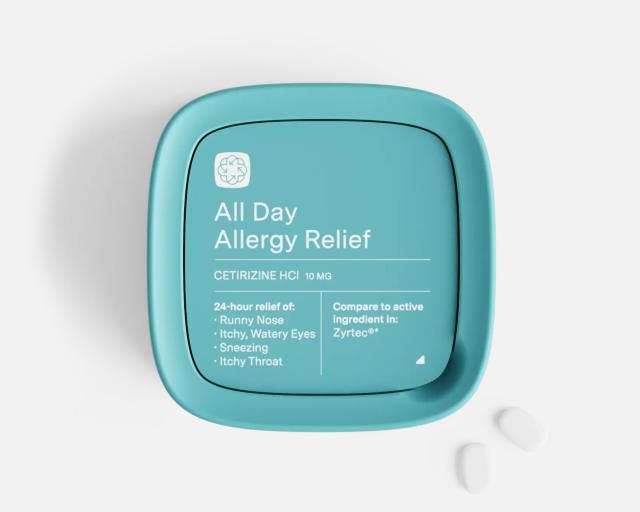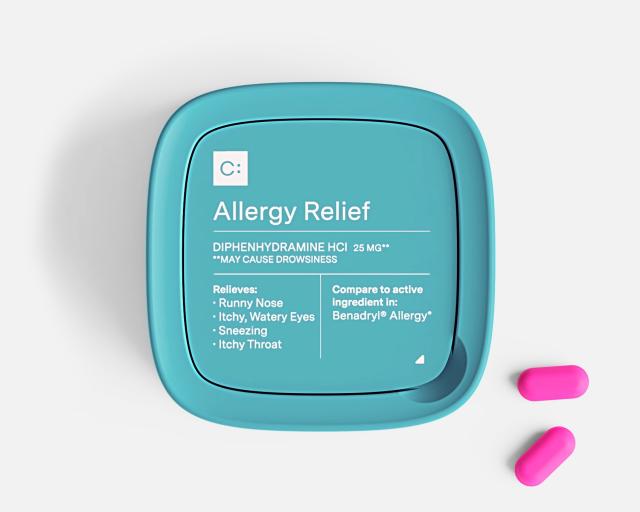Allergy Relief Medicines
Shop Allergy Relief

All Day Allergy Relief (Cetirizine)

Allergy Relief
We’ve got the A to your Q
All FAQsCurated by Experts
Physicians and pharmacists worked together to provide you with common products you may need. These products are among the best of what’s out there.
Rigorously Tested
All of our factories are FDA-audited, ensuring world-class manufacturing processes and healthy sourcing. After leaving our factories, your medicine goes straight to a Valisure laboratory where they are tested for purity, safety (safe from carcinogens and impurities), and gluten (medicines are gluten-free).
Fair Pricing
We will always keep prices fair and honest, especially when you need us the most. Ask us more about our "pay-what-you-can" policy for those in need.
Delivered to Your Door
Avoid an unwanted trip to the pharmacy. Cabinet delivers directly. Perfect for sending to friends or family who are unwell and need your help.
Better for the Environment
Cabinet has developed the first and only non-plastic packaging in pharmaceuticals to address the 194 billion single-use plastic bottles produced by the industry each year. In addition to sustainability in packaging, we invest in plastic offsetting for any plastic still produced in our supply chain, while also providing carbon neutral shipping for all of our customers.
Antihistamines are generally safe for most patients. Older antihistamines, such as diphenhydramine, are not recommended for individuals who have prostate problems or glaucoma. Older adults who are prone to falling and sedation should also avoid using diphenhydramine.
Decongestants are not recommended for individuals with high blood pressure. That’s because they relieve nasal congestion by narrowing blood vessels and reducing swelling in the nose. This process can affect other blood vessels as well, which can increase blood pressure.
If you are pregnant or breastfeeding, consult a healthcare professional before using any allergy medications.
Besides that, most people can take OTC allergy medications with no problems.
Antihistamines are generally safe to be taken daily for a short period of time. However, it is not recommended that you take them every day in the long-term, unless instructed to do so by your healthcare provider.
If your allergies tend to bother you for long periods of time, we recommend that you investigate what triggers them. The allergen might be something that you can avoid having contact with, such as a specific type of tree or pet. Working with an allergist to develop a treatment plan may be the most effective option in the long-run.
Some allergy medications are safe to be combined.
In general, you can use an over-the-counter antihistamine with a decongestant (like phenylephrine). That is, if you have no conflicting medical conditions. Always speak with your doctor prior to taking any nasal decongestants if you have pre-existing chronic conditions.
However, it is not always safe to take two oral antihistamine medications in one day. For example, you don’t want to take a cetirizine pill in the morning and a loratadine pill in the afternoon. Check with your friendly neighborhood pharmacist for questions about antihistamine dosing and side effects.
Even though some allergic reactions are serious, the majority of allergies are mild and some symptoms may resemble that of a cold.
Some common symptoms include:
Sneezing
Itchy, runny, or blocked nose
Watery, red, or itchy eyes
Itchiness, rash, or hives
Shortness of breath and cough
If you feel a couple of these symptoms, especially itchiness, for extended periods of time, you likely have allergies — not a cold.

Joanna Tam, Lead Pharmacist | PharmD